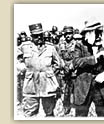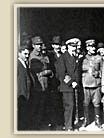|
|
 |
 |
 |
 |
 |
 |
 |
 |
 |
 |
|
During the years 1897-1922, the Army played a decisive role in political developments.
In 1909, with the Military Coup of Goudi, officers protested about the political situation, demanding the gratification of professional claims but also
claims of a more general, social and national character.
|

Enthusiastic popular support had invested it with the prestige of a
social revolution in miniature. Immediately Venizelos set about transferring authority back
to politicians.
This military intervention was characterized by the fact that for the first time officers acted independently of statesmen and that there was
no intention of overthrowing parliamentarism or the social system in general.
The Army had also played an important role in the period of the National
Schism. In August 1916 the National Defence movement broke out
in Thessaloniki, organized by Venizelist officers, its motivation
being concern over the fate of Greek territorial gains from the
Balkan wars. Its main objective was the entrance of Greece in the
First World War on the side of the Entente.
In June 1917 the two armies, that of Athens and Thessaloniki, joined
forces in Macedonia, the two administrations amalgamated and the
Greek army entered the war.
From now on the army was deeply divided into a Venizelist and an
anti-Venizelist bloc. Venizelist retaliation and massive demobilizations
served to consolidate the hatred between the two blocs, inaugurating
a long series of counter-persecutions and demobilizations that continued
until the end of the inter-war period and to a certain extent explained
the continuous interventions of the Army in the political life of
the country in the inter-war period.
Lastly, the Revolution of 1922, as the intervention of the Army after the
debacle of the Asia Minor front came to be known, was the next and even more dynamic independent
military intervention.
|
 |

It expressed the indignation caused by the tragic outcome of the Asia Minor Campaign
and demanded a new measures to counterbalance the national tragedy. It was also the first time that officers took on
authority themselves.
The period from 1909 to 1922 is considered by Thanos Veremis to be an independent period
of military interventions in the political life of the country, having different features
from previous or subsequent ones as concerns characteristics, motives and the
objectives of the intervention. The basic feature was that the Army expressed
national concerns and claims generally accepted by the social body. On the contrary, in the following
period the Army intervened in political life for reasons closer to
its own professional demands.
The causes and the preconditions for the Army's new role in Greek politics during this period are related, from the institutional point of view, to the crisis of the monarchy and the constitutional crisis, that is, to
the clash between the Prime Minister and the King as agents of managing foreign policy. They also concerned
interior changes in the composition of the Army that took
shape during the Balkan Wars and the First World War.
|
 |
 |
|
